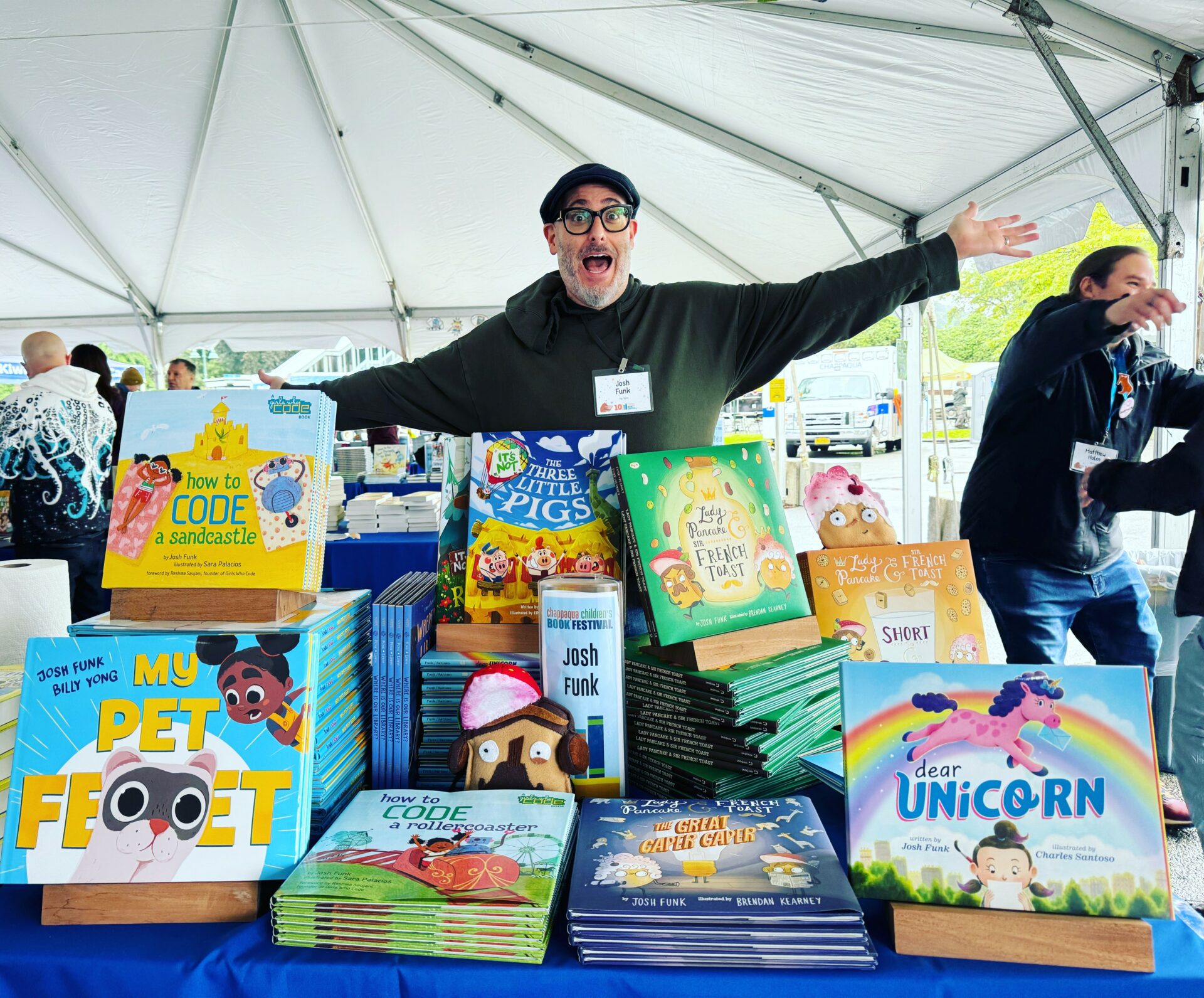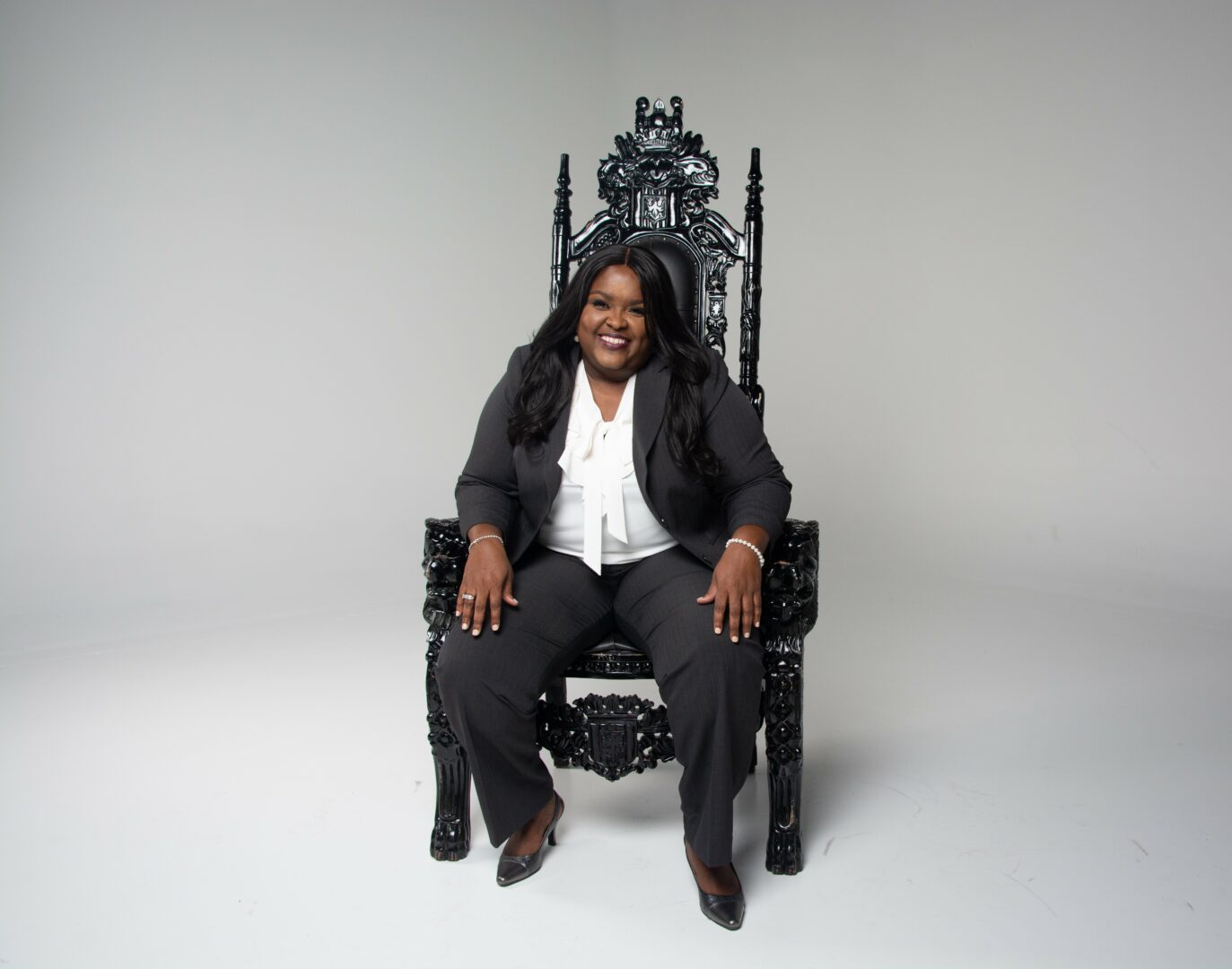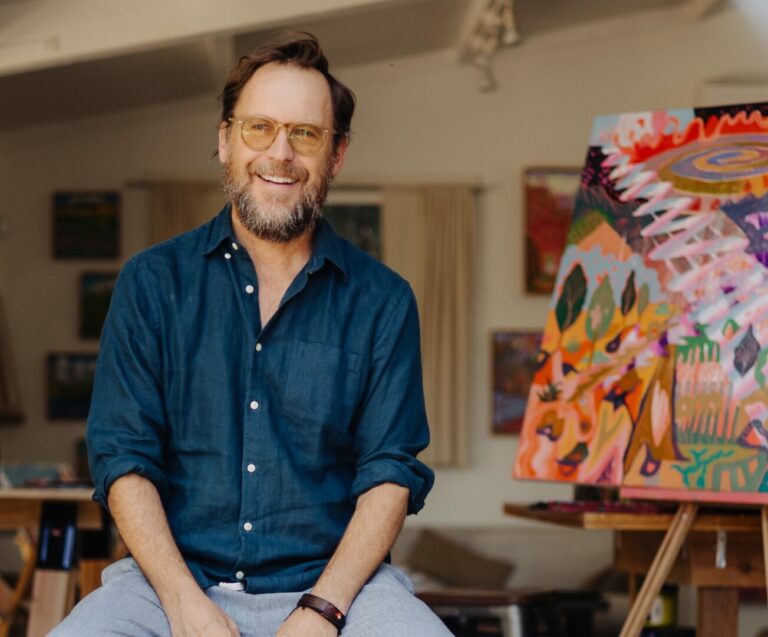We caught up with the brilliant and insightful Josh Funk a few weeks ago and have shared our conversation below.
Josh, so excited to have you with us today. So much we can chat about, but one of the questions we are most interested in is how you have managed to keep your creativity alive.
It hasn’t been easy to keep my creativity alive as a picture book author over the last handful of years. In the world of picture books, I’m mostly known for my silly, funny, clever, and creative titles like Lady Pancake & Sir French Toast, Dear Unicorn, My Pet Feet, and It’s NOT Little Red Riding Hood.
The last half decade plus has been pretty heavy. Between the combative political climate in the U.S., the changing-for-the-worse environmental climate, and a global pandemic, keeping the creative juices flowing hasn’t been easy.
But it all comes down to kids. And reading. As it once said in a social media bio of mine, “I write books for adults to read to children so that children fall in love with reading.” And that’s still true. I’m not a teacher. I don’t know how to help emerging readers with their literacy skills (that’s for educators far more talented than me to handle). I’m just a parent who read to his kids and enjoyed it so much he wanted to try to write his own books.
And when I say I enjoyed it, I don’t just mean the act of reading or the books themselves. I loved the experience of spending time with my kids on the couch reading aloud picture books. And reading the hundreds of chapter books and novels together before bedtime. That’s an experience I want all children (and parents) to have.
So while it might not be in the forefront of my mind as I’m writing a new first draft or revising a manuscript for the thirtieth time, it’s always tucked in there somewhere. This story that I’m working on might be THAT book.
The book that paved the way toward a lifetime of reading.
The book that inspired the child (or parent) to become a writer themselves.
The book that a parent and child remember as the one that made them all fall in love with reading together.
Appreciate the insights and wisdom. Before we dig deeper and ask you about the skills that matter and more, maybe you can tell our readers about yourself?
I’m a software engineer and the author of books like the Lady Pancake & Sir French Toast series, How to Code a Sandcastle, Dear Dragon, My Pet Feet, the It’s Not a Fairy Tale series, Lost in the Library, and more.
I grew up outside Boston, MA and studied Computer Science in school. Today, I still live in New England and when not writing Java code or Python scripts, I drink Java coffee and write manuscripts. Since the fall of 2015 when my first book was published, I have presented (or virtually presented) at over 750 schools, classrooms, and libraries.
My most recent book is called Dear Unicorn, illustrated by Charles Santoso, about a human and a unicorn who are pen pals, but they don’t realize they’re writing to a different species. And in addition to letters, they’re also sending drawings and paintings to each other through the mail. As described by Penguin Random House, the publisher, “Dear Unicorn is a celebration of art, new friends, and stepping outside your comfort zone.” As described in the Indie Next Review, “While you may have other unicorn books, I guarantee you don’t have one quite like this!”
My most recent book in the popular Lady Pancake & Sir French Toast series is The Great Caper Caper, a Las VEGGIES heist, where the team has to steal the fridge light bulb back from the evil Count Caper. The sixth book in the series is forthcoming in 2024 (title still a secret – SHH!).
For more information about me, visit joshfunkbooks.com and on social media at @joshfunkbooks.
There is so much advice out there about all the different skills and qualities folks need to develop in order to succeed in today’s highly competitive environment and often it can feel overwhelming. So, if we had to break it down to just the three that matter most, which three skills or qualities would you focus on?
It might seem obvious, but if you want to be a writer, you’ve got to read. A lot. Especially in the genre or age group you’re writing for. Sure, we all remember Dr. Seuss. But how many contemporary picture book authors or illustrators can you name? Besides the Elephant and Piggie / Pigeon author? (it’s Mo Willems, btw). Exactly. Go to the library and read NEW books. Any newly published book was acquired by publishers at least 2 years ago (publishing is slow). So it’s already somewhat dated as far as trends go. But read. Read. And read some more. Then keep reading.
Find your community. Sure, social media might be a dumpster fire, but there are still *some* positives. There are loads of writers out there in similar spots in their careers as you. Find them. Maybe you’ll end up critiquing each others work. Maybe they’ll give you advice on how to query agents. Maybe you’ll end up helping people who started their journeys after you. If you can afford it, go to conferences and workshops (many are virtual and many of those are pretty). The kidlit writing world is very welcoming. (I can’t speak to the adult writing world – I’ve heard it’s cutthroat, but only secondhand – so write for kids! We’re lovely folk) As my mentor, Heather Kelly of The Writers’ Loft (an in-person and virtual writing community in Hudson, MA) says, “Writing doesn’t have to be a solitary pursuit.” Your community is out there and happy to help.
Keep writing new things. This is the most important piece of advice. The first story you write will likely not be published. Nor will your second. For me, it was my 12th. But I needed to write and revise and submit and get rejections on that first one, so I could learn from it. Writing takes practice and getting published is a long, slow, arduous process. It takes perseverance, sure. You’ll get loads of rejections you’ll have push through, sure (I’ve published 19 books and have received almost 400 rejections – that means for every yes I’ve received, I get 19 no’s – and each no hurts). But it’s critical to keep writing new things. Don’t get too tied to that first story that means so much to you that you revise it to death and never write a second story. I learned so much from that first story (that I now look back on and realize it never had a chance to be published for several reasons). And everything I learned, I took into that second story and that one started in a much better place. And the third was even better. And so on.
Is there a particular challenge you are currently facing?
There are lots of challenges facing the book industry as a whole, and the children’s book industry, but they’re broken down into two major categories: Financial and book bans.
Financial challenges aren’t limited to the book industry, but a post-pandemic recession is certainly affecting publishing in many ways. Consumers aren’t opening their wallets as much as they might be if the economy was thriving, so book sales are slipping slightly from recent years. But the biggest thing affecting authors like me are that publishers are consolidating (big ones are buying small ones), laying off employees, encouraging retirements, and generally shrinking their staff across all departments.
Big picture, what does this mean? It means fewer books will be published, making it harder for authors like me to sell new manuscripts. It means that those books that are published will receive less marketing and publicity. There are ebbs and flows in the economy and we’ve been through this before, so we know it’ll bounce back eventually.
What we haven’t been through before, at least like this, is white supremacist groups like moms for liberty attempting to ban as many books as possible that are written by and/or feature people of color or LGBTQIA+ characters. The basics here: book banning, under any circumstances, is wrong. And the only person that should be determining what a child can or cannot read is that child’s parent or guardian. Not an organization of queerphobic racists.
The real truth is that the only person who should be determining what a child reads is the child themself. Kids will censor themselves when reading. If a book has a bunch of dirty words in it and the kid doesn’t like it, they’ll stop reading. If a book has too much romance in it and kid doesn’t like it, they’ll drop it with an “ew”. And if a book has too much violence or scary stuff in it and a kid doesn’t like it, they’ll put it down.
But everyone deserves to see themselves in books. Whether their identity or skin color is the same as yours or not. And the only way to fight these horrific book banning attempts is with your vote and your voice. Be sure NEVER to vote for anyone who is in favor of book bans of any kind, especially locally and especially on school boards. And go to your local school board meetings, stand up, and voice your opinions against those advocating to rid books from and defund schools and libraries. This is the only way to defeat evil.
Contact Info:
- Website: https://www.joshfunkbooks.com/
- Instagram: https://instagram.com/joshfunkbooks/
- Facebook: https://www.facebook.com/Josh.Funk.Books
- Twitter: https://twitter.com/joshfunkbooks
- Youtube: https://www.youtube.com/joshfunkbooks
- Other: Bookshop.org: https://bookshop.org/shop/joshfunkbooks
Goodreads: https://www.goodreads.com/author/show/8642874.Josh_Funk
Tiktok: https://www.tiktok.com/@joshfunkbooks
Bluesky: https://bsky.app/profile/joshfunkbooks.bsky.social
Threads: https://www.threads.net/@joshfunkbooks












